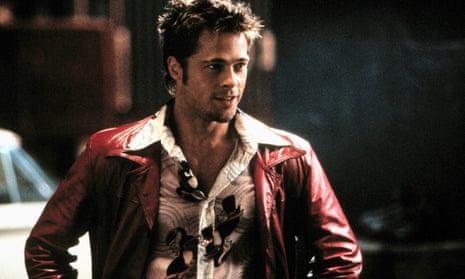When posterity tries to explain the chaos of 2016, much of the attention will fall on the influential figures who drove political events, namely Donald Trump and Nigel Farage. But I’d like to suggest to historians of the future that they should read Fight Club by Chuck Palahniuk.
Startlingly relevant today, 20 years since it was published, Fight Club offers an explanation for some of the vocabulary of the neo-Nazis and rightwing hate merchants who call themselves the “alt-right”.
If, like me, you’ve been confused at being called a “special snowflake” when debating with people about issues like Dumbkirk (read: Brexit), look no further than chapter 17 of Palahniuk’s 1996 novel, when a character reads a note written by the novel’s chief provocateur, Tyler Durden:
You are not special. You’re not a beautiful and unique snowflake. You’re the same decaying organic matter as everything else. We’re all part of the same compost heap. We’re the all-singing, all-dancing crap of the world.
If, meanwhile, you followed the Gamergate problems a few years ago, saw those message boards develop into nodes of far-right agitation, or had the misfortune to hear the likes of Milo Yiannopolous, you will find many of Fight Club’s ideas about carving out a niche for men eerily familiar; frighteningly so, given the wider context of the book and the violence at its core.
Rereading the novel in 2016 is chilling. Researching the book online, I found myself falling down a dark wormhole of fascistic websites that quote big chunks of David Fincher’s film adaptation as parts of their credo; even though parts are almost verbatim from the book, alt-right types tend to quote the film – because they either don’t agree with the overall message of Palahniuk’s book or they haven’t bothered to read it. I’m not going to give those sites the benefit of a link, but if you want to make yourself feel ill, you can Google “radixjournal” and “Generation alt-right” where you’ll find an article by “Hannibal Bateman” quoting (film) Tyler’s idea that:
We’re the middle children of history, man. No purpose or place. We have no Great War. No Great Depression. Our Great War’s a spiritual war … our Great Depression is our lives. We’ve all been raised on television to believe that one day we’d all be millionaires, and movie gods, and rock stars. But we won’t. And we’re slowly learning that fact. And we’re very, very pissed off.
Plenty want to use Fight Club as an inspiration and guide. Perhaps the best reaction is: more fool them. If you see Fight Club as a guide to life and justification for your opinions, your reading of the book is partial at best.
Tyler Durden isn’t a hero and he isn’t building a better world. He is never shown to be right; rather, he is portrayed as a maniac living in a fever dream. The things he does are clearly more than transgressive: they are abhorrent. His actions leave the narrator and moral centre of the book feeling awful, desperate, trapped. He is shown with a rubber band literally and metaphorically tightening around his “gonads, jewels, testes, huevos”. And he shows regret: “I’ve been behaving miserably,” he says in one scene. This is not really a book about “self-actualisation”, unless you want yourself to be physically and mentally screwed up.
So the tragedy is one of misunderstanding, isn’t it? You’re just wrong to see it as any kind of guide to anything. Fight Club book and film are satires. The whole thing is absurd. Isn’t it?
That’s what I’d have thought when I first came across Fight Club around the turn of the millennium. The truth is that back then, I didn’t make much of Palahniuk’s ideas at all. I liked and admired some of them. The work was sometimes dark and violent, but I also found it very funny. The narrative premise of men fighting out their insecurities was the ultimate reductio ad absurdum of the therapy mindset. It all struck me as a gleeful, naughty fantasy. The material about atomisation, alienation and the corrosive impact of consumer capitalism even felt old hat. I certainly didn’t see it as any kind of revolutionary manifesto.
But other people did. You could even argue that Palahniuk encouraged the idea that his book should have concrete impact. “A good story should change the way you see the world,” he said in a Wired podcast in 2011. In an excellent essay about Fight Club, Monkey Think, Monkey Do, he also noted: “Every time we see what’s possible, we make it happen … What’s coming is a million new reasons to go ahead.”
Could he have realised that what was coming was, in communities with little sense of irony or empathy, his visions of ultra-violent masculinity would be seen as validation rather than satire?
Here in the eye of the storm, Brexit and Trump certainly feel like they could be the conclusion of Tyler Durden’s Project Mayhem. But I also suspect my current reaction is more emotional than rational. In spite of what Palahniuk may have said, I’d be loath to hold him responsible for anything. There’s no knowing how a book will be read, used and misinterpreted 20 years after its creation. Authors shouldn’t always be held responsible for the reactions of their readers - and if they were, nobody would dare write.
Yet there’s no point denying that reading Fight Club this year felt different and darker. More prophetic and, yes, more revolutionary. The words were the same, but they’d taken on new meaning. A good story may, as Palahniuk says, change the world. But the world can also change a good story.

Comments (…)
Sign in or create your Guardian account to join the discussion